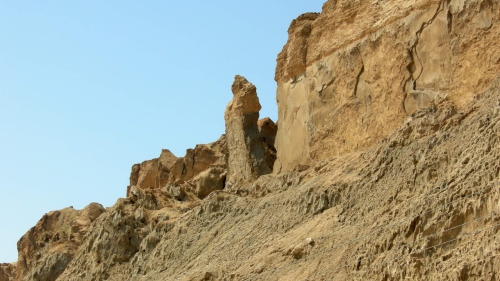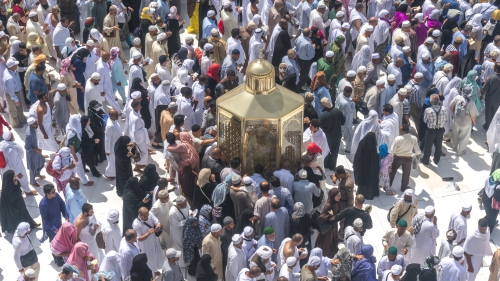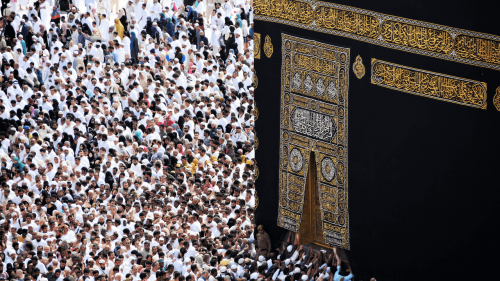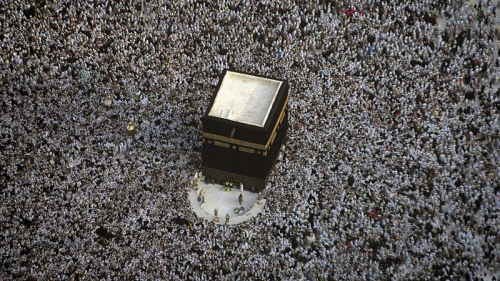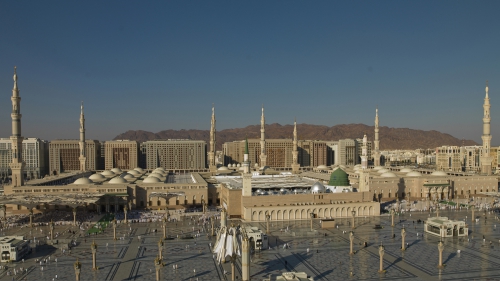Labbayk Allahhumma Labbayk (Here I am, O Allah, Here I am)
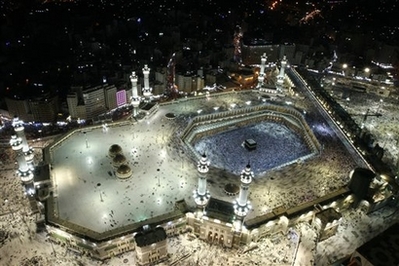 |
Imagine this scenario as you play it in your mind, this is not a scene from a movie but a true story that took place several centuries ago in the vast unending desert, under scorching heat, in a barren land with no inhabitants, no signs of civilization, cultivation or water. On the command of Allah, The great prophet who laid the foundation of Islamic Monotheism, Ibrahim (A.S) left his home with his wife Hajjar and his infant son Ismail (A.S) until he reached a lonely, dry, desolated barren valley between two small hills. He chose a spot for them next to a tree & left them with a bag containing dates and a water-skin containing water. He then started to leave, and so his wife followed him and said, "O Ibrahim! To whom are you leaving us in this barren valley that is not inhabited". She repeated the question several times and Ibrahim did not reply. Then she asked: "Has Allah commanded you to do this?". He said: "Yes". Then she said: "I am satisfied that Allah will never abandon us". Ibrahim (A.S) left, and when he was far away where they could not see him, he faced the direction of the House, raised his hand and supplicated,
"O our Lord! I have made some of my offspring to dwell in an uncultivable valley by Your Sacred House (the Ka'bah at Makkah); in order, O our Lord, that they may perform As-Salat (Iqamat-as-Salat), so fill some hearts among men with love towards them, and (O Allah) provide them with fruits so that they may give thanks. (Surah Ibrahim 14: 37)
Ismail's mother then returned to her place after Ibrahim (A.S) left and started drinking water from the water-skin and nursing Ismail. When all the water was used up, she and her son became thirsty.When she could no longer see her son suffering in that state, she left. She found a mountain nearest to where she was, As-Safa, she climbed the mountain, keeping Ismail in her view while ascending the mountain with the hope of seeing somebody or source of water. When she came down to the valley, she raised her garment and ran, just as a tired person runs, until she reached another mountain, Al-Marwah. In vain, she looked to see if there was someone there. She ran to and fro between the mountains seven times. Ibn Abbas said that the Messanger of Allah (S.A.W) said, "This is why the people make the trip between As-Safa and Al-Marwah (during Hajj and Umrah)."
It is important and obligatory, also a Sunnah as we perform the rite of "Sai", to imagine the hardship, the urgency, the piety and the blind Takhwaa of our mother as she ran thirsty in the scorching hot desert valley, ascending and descending the rough, hard mountainous track searching for water for her son, not once but 7 times back and forth the rough terrain. The distance between Safa and Marwah is approximately 450 yards and the 7 trips amount to a rough 2 miles. Subhan-Allah! we cannot come even close to enacting this experience as we walk through this "arkaan" of "Sai", with several fans in the gallery blowing cool air on the Hujjaj and the smooth marble flooring touching the feet, making this act a breeze with no sweat, just comfort!
When mother Hajjar returned to where Ismail was, she heard a voice and saw Angel Gabriel. She said: "I have heard you. Do you have relief". Angel Gabriel hit his heel ( his wing) on the spot where Zam Zam now exists, underneath the feet of Ismail (A.S), and water gushed out. Hajjar on seeing the water and afraid that it may flow away started digging with her hand to contain the water so she can transfer it to the water-skin. Ibn Abbas said that the prophet (S.A.W) said, "May Allah grant His mercy to the mother of Ismail, had she left the water, (flow naturally without her intervention), it would have been flowing on the surface of the earth." The water of ZamZam is a reminder of Allah's blessings and insha-Allah it will never dry up. Prophet Mohammed (S.A.W) said: "The water of ZamZam is for whatever it is drunk for".
Ismail's mother started drinking the water and could nurse her child. Then Angel Gabriel said to her, "Do not fear abandonment. There shall be a House for Allah built here by this boy and his father. Allah does not abandon His people".
Afterward some people from the tribe of "Jurham" passed through this valley and were astonished to see birds. They knew that birds can be found at a place where there is water. They had crossed the valley before and had not noticed any water in it. They sent some people to search the area, they returned with the news of water. They all went to the mother of Ismail and asked her if she would allow them to dwell on the land. She agreed but told them that they would not have any exclusive rights over the water. They agreed and stayed there and sent for their relatives to join them. Ismail (A.S) learnt Arabic from them and later Hajjar died. But the sacrifice, the hardship ant the patience bore by our mother and her Takhwah and obedience to Allah is still remembered with reverence to this day and will be till the end of time. It is enacted and retraced in the Rite or arkaan called "Sai" during Hajj and Umrah by millions of pilgrims. The lesson of obedience, trust, sacrifice and complete unquestionable submission to Allah only to please HIM, whether it was to leave his son and wife in a barren valley or the willingness to sacrifice his son on Allah's command was taught to us by Ibrahim (A.S).
Later when Allah commanded, Ibrahim returned to Makka and asked Ismael to help him build Kabah. He pointed Ismail to an area above ground level. So both of them started to raise the foundations of the House. Ibrahim started building the Kabah while Ismail continued handing him the stones. Both of them kept saying:
"Our Lord! Accept (this service) from us. Verily! You are the All-Hearer, the All-Knower." (Surah Al-Baqara 2:127)
"Our Lord! And make us submissive unto You and of our offspring a nation submissive unto You, and show us our Manasik (all the ceremonies of pilgrimage - Hajj and 'Umrah), and accept our repentance. Truly, You are the One Who accepts repentance, the Most Merciful. (Surah Al-Baqara 2:128)
"Our Lord! Send amongst them a Messenger of their own who shall recite unto them Your Verses and instruct them in the Book (this Qur'an) and Al-Hikmah, and purify them. Verily! You are the All-Mighty, the All-Wise." (Surah Al Baqara 2:129)
The Messenger of Allah was written as the Final Prophet when Adam was still clay. Yet, Ibrahim (A.S) supplicated and Allah accepted Ibrahim's supplication, although HE had full knowledge beforehand that it will occur by HIS decree. This reminds with the Hadith about what the Messenger of Allah said when he was asked, "O Messanger of Allah! Tell us about how your prophethood started." He said:
"I am the supplication of my father Ibrahim, the good news of Jesus, the son of Mary, and my mother saw a light that radiated from her which illuminated the castles of Ash-Sham (Syria)".
Prophet Ibrahim was ordered to build Kabah to worship and to call people to do the same. Ibrahim (A.S) pleaded, "O Allah! How shall my voice reach all of those people?". Allah Subhannahu Ta'aala told him that his duty was only to give the call and it was up to Allah to make it reach he people. Ibrahim (A.S) then climbed Mount Arafat and called out in his loudest voice, "O People! Verily Allah has prescribed upon you Hajj, so perform Hajj."
Allah revealed in the Quran:
And proclaim to mankind the Hajj (pilgrimage). They will come to you on foot and on every lean camel, they will come from every deep and distant (wide) mountain highway (to perform Hajj). ( Suarh Al-Hajj 22: 27)
SubhanAllah, true to Allah's words even to this day, millions of Muslims from distant and far away lands representing one faith yet different regions, races, class and culture visit the House of Allah, in answer to the original call of Prophet Ibrahim (A.S) and Prophet Mohammed (S.A.W). Millions every year chant almost in unison their heart, mind & soul elevated through the beautiful glorifying words of "Talbiyah" that our beloved Prophet (S.A.W) taught us as they go about performing the "Manaasik" of Hajj:
"Labbayk Allahumma Labbaik, (Here I am at your Service, O Allah, Here I am)
Labbayk La Sharika Laka Labbayk, (Here I am, You have no partner, Here I am)
Innal Hamda Wan Ne'mata Laka Wal Mulk ( Verily all praise & blessings are Yours & all Sovereignty)
La Sharika Lak", (You have no partner)
Allah's door of Mercy and forgiveness is always open for HIS believers who call upon HIM with complete faith, repentance and hope in HIM. HIS Mercy is all encompassing. HE is the Most Compassionate and the Most Merciful. We are children of Adam (A.S) and it is innate in our nature to sin. Allah is cognizant of this weakness, since HE is our Creator "Khaaliq". HE repeatedly gives us a chance to cleanse ourselves from our sins. "Hajj", one of the pillars of Islam is like a conduit, to ask Allah for HIS favors and forgiveness. Insha-Allah, May Allah bless all the Muslim Ummah to visit the First house of Allah Subhanahu Taala and may their Hajj be accepted (Mabroor). Indeed, as our beloved Prophet Mohammed (S.A.W) said: "And there is no reward for an accepted Hajj except Jannah!".
Topics: Allah, Hajj, Nature And Environment, Prophet Ibrahim (Abraham), Prophet Ismail (Ishmail), Talbiyah, Water
Views: 15027
Related Suggestions












